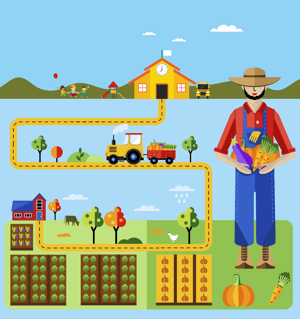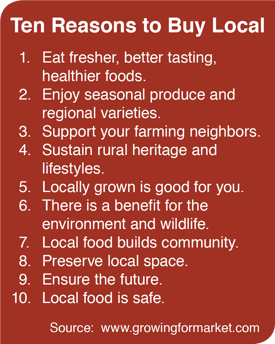 Farm-to-School Programs
Farm-to-School Programs
With the Healthy, Hunger Free Kids Act, the National School Lunch Program requires a greater variety of vegetables be served throughout the school week. However, getting children to try vegetables has proven to be a challenge. As a result, many schools are implementing farm-to-school programs. The National Farm to School Program was authorized by Congress in 2004, with the intent to supply fresh, locally grown foods to schools. Children are more willing to try new foods if they interact with the grower. Local farmers also benefit from financial opportunities by supplying schools and food distributors.
Besides including locally grown foods on the school menu, farm-to-school activities can enhance classroom education through hands-on learning with school gardens and composting programs. Children learn the source of their food and how food choices affect their health, the environment, and their communities. School gardens improve children’s attitudes towards produce and they are more likely to eat fruits and vegetables that they grow.
 Shortening the distance between the farmer and the school, helps reduce greenhouse gas emissions and benefits our environment and wildlife. When food doesn’t have to travel so far, it also is less prone to chemical, physical, and biological hazards.
Shortening the distance between the farmer and the school, helps reduce greenhouse gas emissions and benefits our environment and wildlife. When food doesn’t have to travel so far, it also is less prone to chemical, physical, and biological hazards.
A successful farm-to-school program includes students, parents, farmers, school food service staff, teachers, community, etc. People like to hear about the story of their family, their operation and how they bring their products to market. Other farm-to-school activities can include nutrition education with cooking and tasting activities.
Buying Locally Grown for Families
Buying locally grown food for your family is also a great way to eat flavorful, healthy meals while supporting your local economy!
Plus, knowing your local farmers and food producers gives you a stronger sense of place, relationships, trust, and pride within your community.
To find local food for your family, visit www.localharvest.org.
GA Foods' and Locally Produced Foods
GA Foods is committed to using locally grown and produced foods in all of the markets we serve. Our distributor works with local farmers to source produce. We use a local dairy for our milk and a local bakery for our breads and rolls.
Buying locally supports Florida's economy and keeps local people employed. To get an idea of the impact that child nutrition programs have on the local community and economy, watch this video. For information on our child nutrition offerings, click here.










